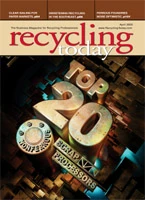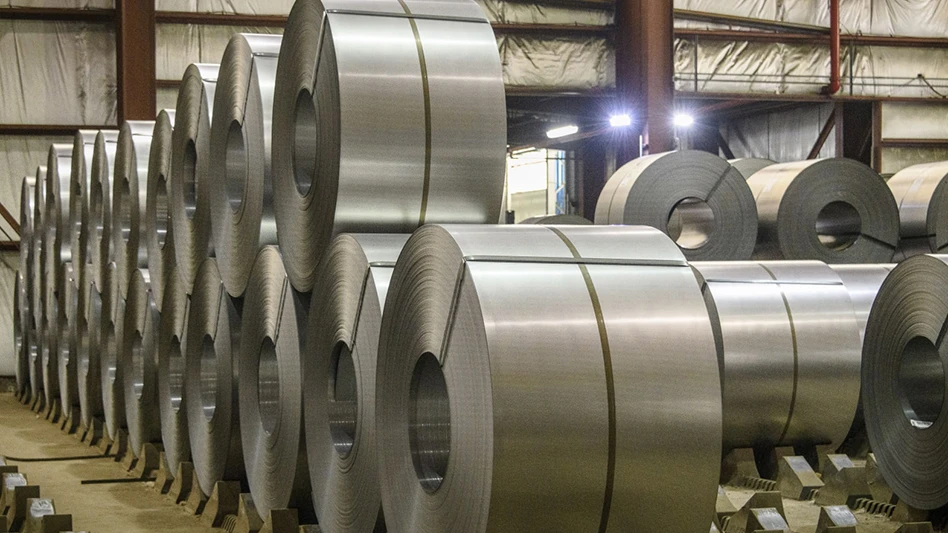 Peter MacAvoy |
T
he Golden Rule—treating others as you would like to be treated—must be easier to memorize than it is to put into practice. As Peter McAvoy says his father repeatedly told him, ifeveryone obeyed this one simple rule, there would be no need for the Ten Commandments or the layers of global, federal, state and municipal laws that are on the books.
While McAvoy is limited in his ability to spread his father’s wisdom to the world at large, he has worked hard to apply it to the practices of Industrial Metal Recycling (IMR), the family business based in Oakland, Maine, that he now runs.
The success IMR has had in the past two decades shows that honesty is the best policy and that, happily, nice guys do not always finish last.
EARLY SCRAP EXPOSURE
The scrap metal industry has been a familiar part of Peter McAvoy’s life from an early age. Peter was one of eight children (seven boys, one girl) growing up as part of a family that followed their father where his job as a "rigger" took him. His father’s work involved constructing, assembling and repairing machinery at great heights and in other hard-to-reach places. "Whenever there was a tough job anywhere in the country, including Pearl Harbor after the attack, they knew they could call George McAvoy," recalls Peter.
Originally from Maine, the McAvoy family travels took Peter to different parts of the country and spurred him and his older brothers to seek out different types of work when arriving in new cities. During a stay in Kansas, one of Peter’s older brothers worked at a scrap yard, a business that intrigued Peter. "I started my career at age six, when I found out from my older brother how scrap yards pay cash for discarded metal," Peter recalls. "I joined up with two girls at my school who had a red wagon, and we looked for metal to bring to the scrap yard." Peter chuckles recalling that one of the young crew’s best "sources" of metal was just over the fence line of the scrap yard’s property, where pieces of scrap in higher piles occasionally fell over the fence.

"The owner of the scrap yard knew, and wanted to clean it up, but didn’t have enough full-time help to do it," he says. "So he gave me a magnet and told me he would pay more for the shiny stuff that didn’t stick to the magnet."
Many years after his red wagon days, while Peter was recovering from a broken back suffered while working as a longshoreman, one of his other brothers and a friend entered the scrap business in Maine.
They worked as peddlers for scrap that they took to the yards of dealers. "They would work hard for a couple of days, then spend a week enjoying living off what they had made," Peter says. "I wondered what would happen if you worked full-time and didn’t take the time off to spend your money."
At the time, Peter was having trouble finding work. "I convinced my local banker to loan me $500 to by a 20-year-old, one-and-a-half ton truck and a set of torches," he recalls. "I had no collateral, but he said he would stick his neck out because I had a job lined up to clean up an old granite quarry for the state of Maine. The quarry is now a state park, and more than 30 years later I’m still with the same bank."
| Equipped for Success |
|
Industrial Metal Recycling (IMR) has thrived over the past 15 years for several reasons, but President Peter McAvoy points out the company’s willingness to invest in high-quality equipment. IMR has major commitments with key equipment suppliers that its research has shown offer maximum productivity and reliability. IMR facilities typically inventory 3 to 4 million pounds of finished nonferrous product and 30,000 to 60,000 tons of ferrous. For metals processing, IMR has purchased 10 pieces of equipment from Sierra International Machinery LLC., Bakersfield, Calif., developing a close relationship with the Sacco family that owns it. "The relationship with the Sacco family and their equipment has been a good part of the Industrial Metal story," says Peter. "The only problem with their balers and shears is that for awhile we couldn’t load them fast enough," he says. IMR addressed that by upgrading its material handling equipment. "It was a little tough to pull the trigger" on the purchase of two new Sierra machines when IMR was still young and unestablished, Peter says. But he immediately saw high productivity returns from the purchases and continues to be impressed by their performance. "I can’t even estimate how many tons have now gone through those first two shear-balers." IMR’s attention to equipping itself properly has paid off, Peter says. IMR has increased productivity while reducing staff, allowing Peter to pay competitive wages. IMR’s productivity makes it a keen competitor. "One by one, the companies we compete with that haven’t invested in better equipment and put money back in their businesses have disappeared," he says. |
Eventually, Peter and his brother Brian started a scrap and salvage business that often concentrated on harvesting the metals at abandoned industrial sites. This business ultimately produced the opportunity that created Industrial Metal Recycling.
CLEANUP CREWS
"It all kind of started in 1986 with me getting a phone call about a large factory that was once here in Oakland called Diamond Match," says Peter of the origins of Industrial Metal Recycling.
The Diamond Match plant produced matches, ice cream bar sticks and other sawmill products. Although Peter’s initial interest was in cleaning out the site and perhaps purchasing obsolete equipment, it soon became clear that the ownership group wanted an offer for the entire property.
Surprisingly to Peter, the owners accepted what he considered to be a low offer for the property. "We sold off a lot of equipment and got the money back we invested in it and started running a scrap company from the property," says Peter, who eventually bought out his partner in the venture.
The newly established IMR soon took on a family feel, as Peter’s younger brother Brian and other family members began playing key roles in the business. Peter says he looks back fondly on the days when he could pay his younger brother in M&Ms to strip a motor block or otherwise prepare scrap.
Having made a commitment to enter the scrap metals business, it was clear that the McAvoys were going to need a niche. Based on their initial real estate clean-up experiences, offering a combination abandoned site clean-up and scrap disposition service was a logical choice.
IMR also began offering a service to towns where it drained hazardous fluids and prepared white goods for baling in a portable Sierra machine, shipping the scrap to awaiting markets in Montreal.

Current IMR CFO Wayne Bowers is also trained as an environmental chemist, which helps the company maintain its competitive advantage in cleanup and proper material handling techniques.
INSPIRING CONFIDENCE
Since its creation in 1986, IMR has grown by any yardstick used. It has grown in volume of materials handled; the size of its customer base; the amount of processing equipment it uses; number of employees; annual revenue; and the number of facilities from which it operates (from the original one to four).
Peter credits the Golden Rule as the cornerstone of the IMR’s success. "My father always said give at least $1.10 worth of work for every $1.00 someone gives you.
"We really have tried to build the business just by doing the right thing. We’ve just continued to add more and more customers. We don’t have any salespeople; our customers are our salespeople. And now we have a company we’re quite proud of."

Explore the April 2005 Issue
Check out more from this issue and find your next story to read.
Latest from Recycling Today
- Fitch Ratings sees reasons for steel optimism in 2025
- P+PB adds new board members
- BlueScope, BHP & Rio Tinto select site for electric smelting furnace pilot plant
- Magnomer joins Canada Plastics Pact
- Out of touch with reality
- Electra names new CFO
- WM of Pennsylvania awarded RNG vehicle funding
- Nucor receives West Virginia funding assist





